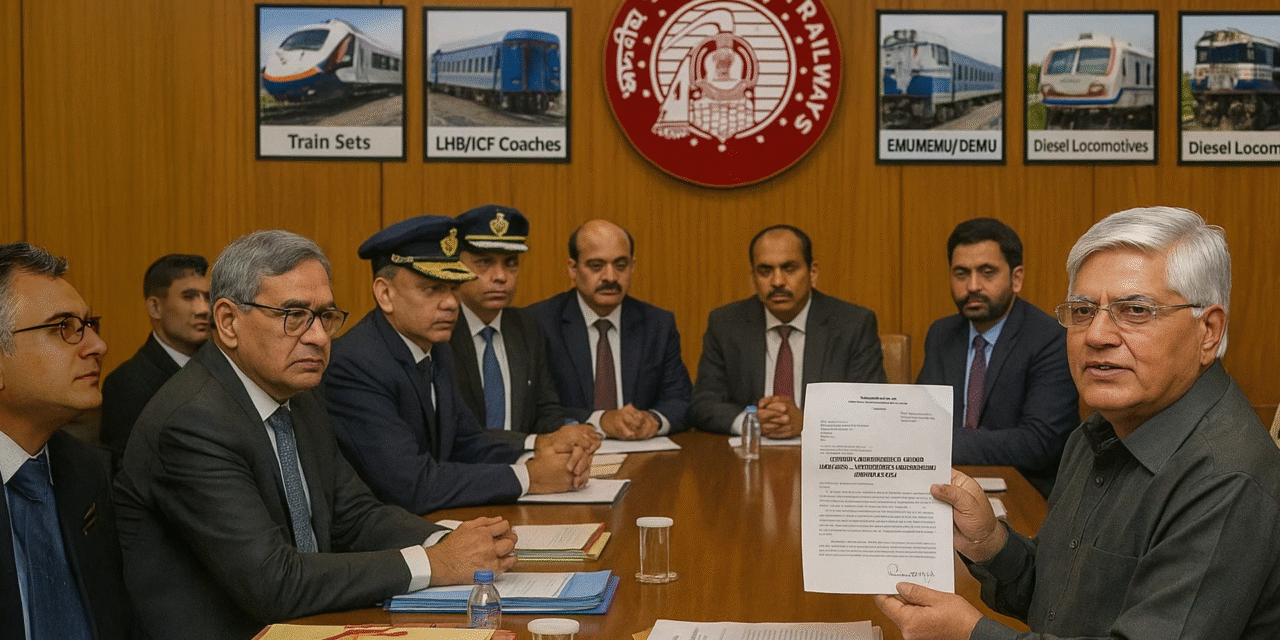
No. AIRF/19 (23-3)
The Member (Traction & Rolling Stock)
Railway Board,
Ministry of Railways,
Rail Bhawan, New Delhi.
Sub: Request for Revision & held in abeyance of Instructions issued on Manpower Management of Mechanical & Electrical Officers/Staff in Maintenance of Train Sets, LHB/ICF Coaches, EMU/MEMU/DEMU & Diesel Locomotives – Letter to Railway Board – 02.08.2025
Dear Sir,
The All India Railwaymen’s Federation (AIRF) would like to draw your kind attention to a matter of serious concern regarding the recent instructions issued vide letter dated 25.07.2025, by the Railway Board on the subject cited above. These instructions, involving the integration of Mechanical and Electrical Departments for manpower management, have generated widespread dissatisfaction and unrest among staff across the Indian Railways.
The decision to restructure the administrative framework, particularly the directive placing the TL/AC wing of the Electrical Department under the administrative control of Sr. DME/C&W, has been taken unilaterally and without consultation with the recognized federations. This approach has not only undermined the long-standing structure of functional specialization but also poses significant risks to operational safety and efficiency.
The Indian Railways introduced electric lighting in 1902 and air-conditioned coaches in 1934. Since then, the Electrical Department has been exclusively responsible for the maintenance of electrical systems within rolling stock, while the Mechanical Department has handled non-electrical components. Over time, this clear demarcation of responsibilities has evolved into a robust system that underpins the safety and reliability of railway operations.
The newly issued instructions disrupt this functional clarity and attempt to unify two technically distinct domains without adequate planning or stakeholder engagement. The key concerns and implications raised due to the issue of these instructions are given as under:
- Electrical (TL&AC) staff are professionally trained and certified to work with high-voltage systems, including 750V AC and 440V AC, which are integral to modern train lighting, air-conditioning, power cars, and propulsion systems. However, Mechanical staff has lack of the requisite training or certification to manage such systems. The proposed reporting structure creates a void in technical supervision and guidance, exposing field staff and assets to elevated safety risks due to High Voltage Systems.
- Each department has developed its technical domain, recruitment standards, training modules, and operational protocols. The merger undermines:
- Skill relevance: Mechanical staff are not equipped to manage complex electrical subsystems, and vice versa.
- Maintenance quality: Duties carried out by inadequately trained personnel will likely result in increased failures and safety hazards.
- Training burden: Extensive cross-training would be needed, causing resource strain and maintenance delays.
- Accountability loss: Blurring departmental lines may obscure responsibility in cases of system failure or technical lapses.
With the Railways moving towards more technologically advanced rolling stock, the need for domain-specific expertise is more critical than ever. Thus, the action for merging two departments without acquiring specialized skills would be cause for adverse impact on Career Progression.
- At the ground level, such integration will create confusion over administrative control, performance evaluation, and technical support. Electrical supervisors and staff are already expressing concern over unclear lines of reporting, grievance redressal, and responsibility, which creates a further administrative ambiguity.
- Electrical coaching maintenance demands a high degree of technical knowledge, gained through formal education and experience, culminating in Sr. DEE/G or Sr. DEE/Chg. These officers dedicate a major portion of their service to coaching operations. It is unreasonable to expect from Sr. DMEs, who do not possess electrical qualifications, to manage such responsibilities effectively.
- The instruction for AC-TL staff to report to Mechanical officers may pave the way for a de facto merger of Electrical and Mechanical cadres. There are apprehensions that such reporting lines will lead to dual responsibilities, extended working hours, and harassment, with staff being made accountable for failures beyond their technical domain.
In light of the foregoing, the AIRF strongly urges the Railway Board to:
- Immediately put the above-mentioned instruction dated 25.07.2025 in abeyance, and
- Maintain functional and administrative separation between the Electrical and Mechanical cadres, particularly in matters related to maintenance of coaching services.
- Alternatively, coordination between the departments may be achieved through established inter-departmental mechanisms without compromising technical integrity or merging cadres.
The existing system, where Electrical coaching maintenance is overseen by Sr. DEE, has proven its efficacy over decades. Any deviation, especially for administrative convenience, should not come at the cost of safety, reliability, and staff morale.
The implementation of the current policy will have serious repercussions on safety, derail the pace of infrastructure development, and destroy employee morale, outcomes that no responsible administration can afford.
Before the situation escalates into unrest among the workforce, we strongly urge the Railway Board to convene an urgent meeting with AIRF to deliberate on this matter comprehensively and arrive at a mutually acceptable solution and in the meanwhile hold in abeyance the Board’s letter dated 25.07.2025.
Yours sincerely,
(Shiv Gopal Mishra)
General Secretary
Copy to: General Secretaries of all affiliated Unions – for information.





